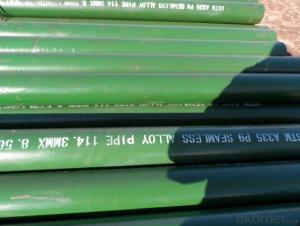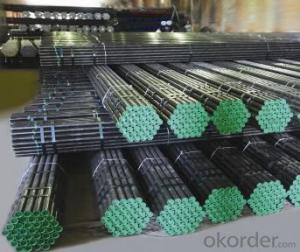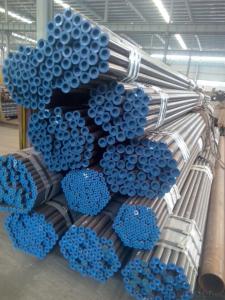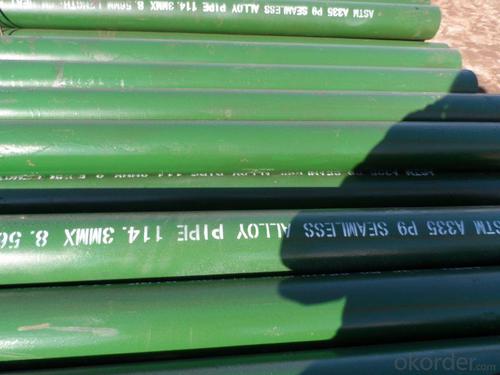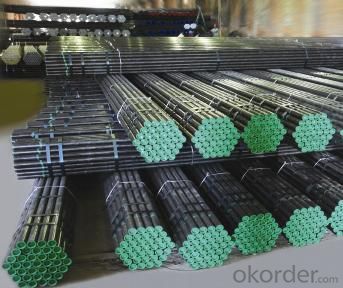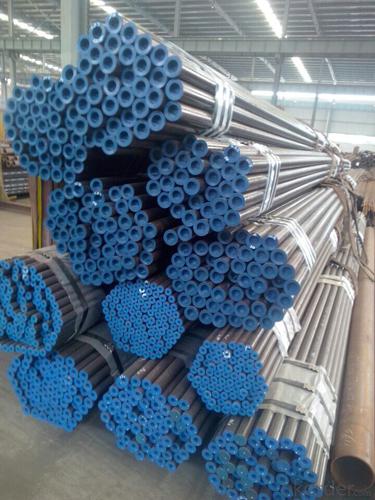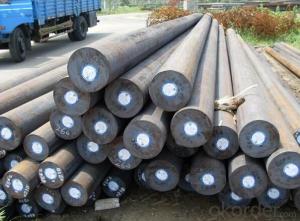Steel pipe A335P9 1-18
- Loading Port:
- China Main Port
- Payment Terms:
- TT OR LC
- Min Order Qty:
- -
- Supply Capability:
- 200T m.t./month
OKorder Service Pledge
OKorder Financial Service
You Might Also Like
A335P9 Steel pipe The standing stock of specifications
A335P9 Steel pipe 70*4.5-5-6-7-8-9-10-12-15-16
A335P9 Steel pipe 245*8-10-14-17-20 -22-30-40
P5 C≤0.15 Mn 0.3-0.6 P ≤0.25 S≤0.25
Si 0.25-1.0 Cr 8-10 Mo 0.9-1.1
Alloy pipe is a steel pipe according to the production materials (i.e. material) to define, just as its name implies is made of alloy steel seamless pipe; and is in accordance with the production process (seamed seamless) to define, seamed pipe seamless pipe is different from, including straight seam welded pipe and spiral tube.
Manufacturing process
1 hot-rolled (extrusion seamless pipe): billet, heating, perforation, three roll cross rolling, rolling or extrusion, tube off, sizing pipe (or reducing), cooling, straightening, water pressure test (or testing), marking, storage
2 cold drawing (rolling) seamless steel pipe: billet, heating, perforation, heading, annealing, pickling, oiling round tube (copper) and multi pass drawing (Leng Zha), the blank pipe, heat treatment, straightening, water pressure test (testing), marking, storage
[(diameter - thickness) * wall thickness of]*0.02466=kg/ meters (per metre weight)
Alloy pipe use
Alloy pipe for low and medium pressure boiler (work pressure is generally not more than 5.88Mpa, the operating temperature at 450 DEG C) of the heating surface tube; used for high pressure boiler (work pressure is generally above 9.8Mpa, operate at a temperature of 450 DEG to 650 DEG C between) the heating surface tubes, economizer, superheater, reheater, petrochemical industry uses the tube and so on.
- Q: What are the common applications of steel pipes in the water distribution system?
- Steel pipes are commonly used in water distribution systems for various applications such as transporting water from treatment plants to distribution points, carrying water under high pressure, and providing a durable and long-lasting solution for underground water pipelines.
- Q: How are steel pipes used in the manufacturing of wastewater treatment systems?
- Steel pipes are used in the manufacturing of wastewater treatment systems for various purposes such as carrying and transporting wastewater, providing structural support to the system, and facilitating the flow of water and chemicals throughout the treatment process.
- Q: What is the difference between steel pipe and PVC pipe?
- Both steel pipe and PVC pipe are commonly utilized materials for plumbing and other construction purposes; however, they possess several distinct dissimilarities. To begin with, the materials themselves differ. Steel pipe is manufactured from a blend of iron and carbon, known as steel. This material is renowned for its robustness and durability, rendering it appropriate for high-pressure applications and subterranean installations. Conversely, PVC (polyvinyl chloride) pipe is crafted from a type of plastic called PVC. PVC pipe is characterized by its lightweight nature, flexibility, and ease of handling, making it a favored choice for residential plumbing and irrigation systems. Next, the installation process varies. Steel pipe necessitates skilled labor and specialized tools for cutting, threading, and welding. It frequently involves a complex installation procedure, particularly for larger pipe sizes. Conversely, PVC pipe can be effortlessly cut with a saw or specialized pipe cutter and joined together utilizing solvent cement or threaded fittings. This renders PVC pipe more suitable for DIY projects and simpler installations. Moreover, steel pipe incurs greater costs compared to PVC pipe. Steel is a pricier material, and the manufacturing process for steel pipe is more intricate, entailing multiple steps and additional materials. PVC pipe, as a plastic-based material, is generally less expensive and more cost-effective, particularly for smaller diameter applications. In terms of performance, steel pipe possesses greater tensile strength, can endure higher levels of pressure, and exhibits greater resistance to temperature fluctuations, rendering it ideal for heavy-duty and industrial applications. Conversely, PVC pipe possesses lower tensile strength but is resistant to corrosion, chemicals, and scale buildup. PVC pipe is commonly employed in residential plumbing, irrigation systems, and other non-industrial applications. To summarize, the primary disparities between steel pipe and PVC pipe revolve around the materials used, installation processes, costs, and performance characteristics. While steel pipe is sturdier and more suitable for heavy-duty applications, PVC pipe is lighter, easier to install, and more cost-effective for residential and non-industrial purposes.
- Q: How are steel pipes used in the construction of high-rise buildings?
- Steel pipes are commonly used in the construction of high-rise buildings for various purposes, including structural support, plumbing, and fire protection. These pipes provide strength and durability to support the weight of the building, allowing for taller structures. They are used to create the building's framework, as well as for the distribution of water, gas, and other utilities throughout the building. Additionally, steel pipes are often used for fire sprinkler systems, providing a reliable and efficient method of fire protection in high-rise buildings.
- Q: Can steel pipes be used for conveying hazardous chemicals?
- Steel pipes can be used for conveying hazardous chemicals, as they are highly resistant to corrosion and can withstand high pressures. However, it is crucial to consider the compatibility of the chemicals with steel and ensure that appropriate safety measures and protective coatings are in place to prevent any potential leaks or reactions.
- Q: What does the diameter of a steel pipe project mean?
- Suppose we specify a standard that defines the nominal diameter of the same steel tube as G-1, then this G-1 is the same as DN50.I hope it doesn't make you any more confused, huh?. If you still don't understand, keep in mind that the nominal diameter is neither outside nor inside diameter.
- Q: What are the different coatings applied to steel pipes?
- There are several different coatings applied to steel pipes, including epoxy coatings, polyethylene coatings, zinc coatings (galvanization), and fusion bonded epoxy coatings. These coatings are used to protect the steel pipes from corrosion, increase their durability, and improve their performance in various environments.
- Q: Can steel pipes be used for piling?
- Yes, steel pipes can be used for piling. Steel pipes are often used as piles in construction projects due to their strength, durability, and ability to withstand heavy loads. They provide strong support for structures and are commonly used in foundation systems for buildings, bridges, and other infrastructure.
- Q: What are the different standards for steel pipe manufacturing?
- There are several standards for steel pipe manufacturing, including ASTM (American Society for Testing and Materials), API (American Petroleum Institute), DIN (Deutsches Institut für Normung), and JIS (Japanese Industrial Standards). These standards define the specifications for various aspects of steel pipe production, such as dimensions, material composition, mechanical properties, and testing procedures. Compliance with these standards ensures the quality and reliability of steel pipes for different applications, ranging from construction and infrastructure to oil and gas industries.
- Q: What are the common maintenance practices for steel pipes?
- Steel pipes require regular inspections, cleaning, and corrosion prevention as part of their maintenance. It is crucial to conduct inspections frequently to detect any signs of damage or wear. These inspections can involve visual assessments and non-destructive testing methods like ultrasonic or magnetic particle inspection. Scheduling inspections ensures early detection of issues, allowing for prompt resolution. Cleaning is also a vital maintenance practice for steel pipes. It involves the removal of dirt, debris, and scale that may accumulate on both the inside and outside of the pipes. Regular cleaning prevents blockages, enhances flow efficiency, and reduces the risk of corrosion. Corrosion prevention plays a significant role in maintaining steel pipes. Different methods, such as applying protective coatings, utilizing cathodic protection systems, or implementing corrosion inhibitors, can be employed to safeguard the pipes. These measures extend the pipes' lifespan and preserve their structural integrity over time. Additional maintenance practices may include repairing or replacing damaged sections of the pipes, maintaining proper insulation to prevent heat loss or gain, and monitoring the pipes for any signs of leakage or pressure drops. In summary, regular inspections, cleaning, and corrosion prevention are vital maintenance practices for steel pipes. Implementing these practices prolongs the pipes' lifespan and allows for the identification and resolution of potential issues before they cause significant damage or disruptions.
Send your message to us
Steel pipe A335P9 1-18
- Loading Port:
- China Main Port
- Payment Terms:
- TT OR LC
- Min Order Qty:
- -
- Supply Capability:
- 200T m.t./month
OKorder Service Pledge
OKorder Financial Service
Similar products
Hot products
Hot Searches
Related keywords
